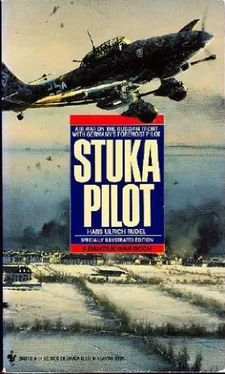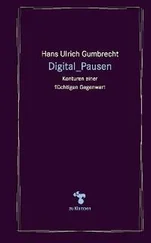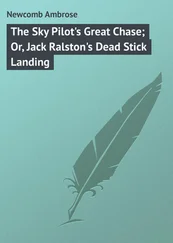We often see him now when he visits our base to confer with me on the momentary situation and to discuss possible operations. The results of our reconnaissance, especially, are of the greatest value to him. At this time Squadron Leader Lau is reported missing with his crew; he is hit by flak and has to force-land in the Gross-Wartenberg area and is captured by the Russians. He comes down right in the midst of a Soviet force after an attempt to land near-by has proved impossible.
Slowly the Oder front is established a little. I receive an order by telephone to move the Wing immediately to Märkisch Friedland in Pommerania and the 2nd Squadron to Frankfurt, the situation there being more dangerous than it is in Silesia. Thick driving snow prevents our moving in close formation, so we take off at intervals in threes heading for Märkisch Friedland over Frankfurt. Some of our aircraft come down at the intermediate airfields at Sagan and Sorau. The weather is abominable. At Frankfurt they are already waiting for me to land; I am to ring up my old base at Grottkau without delay.
When my call has been put through—I learn that soon after my departure Field Marshal Schörner had been over to see me and had raised Cain. Banging his fist on the table he had asked who had given the order for me to leave his sector. Flight Lieutenant Niermann, my operations officer, had told him that the order came from the Group and the Air Command.
“Group and Air Command indeed! All window dressing! I want to know who took Rudel away from here. Ring him up at Frankfurt and tell him to wait there. I am taking the matter up with the Führer himself. I insist on his staying here. Am I supposed to hold the front with nothing but rifles?”
I learn all this over the telephone. If I am to reach Märkisch Friedland before dark I have no time to waste. I ring up the Führer’s H.Q. to ask whether I am now to continue or return to Silesia. In the first case, Field Marshal Schörner must release my personnel at present detained by him at Grottkau so that I may have my full complement of staff and material when I arrive. I am informed that a decision has just been reached: my wing has definitely been transferred to the north as the situation in that sector which has recently been put under the command of S.S. Reichsführer Himmler is indeed more serious. I land at Märkisch Friedland with the first few aircraft in a dense snow storm and complete darkness; the rest of the unit is due to arrive tomorrow, the 2nd Squadron will remain at Frankfurt and operate from there. When we have found makeshift quarters for the night I ring up Himmler at Ordensburg Krossinsee to report my arrival in his sector. He is pleased that I am here and that he has won the duel with Field Marshal Schörner. He asks me what I would like to do now. The time is 11 P.M., so I reply: “Go to sleep”—for I want to be out early to get a general picture of the situation. He thinks differently.
“I can’t sleep,” he says.
I tell him that he has not got to fly tomorrow morning, and that when one is flying without intermission sleep is indispensable. After much palaver he tells me that he is sending over a car to fetch me as soon as possible. As in any case I am short of fuel and ammunition an introduction to the new sector by its commander may at least simplify a number of organization problems. On the drive to Ordensburg we are stuck in a snow drift. When I get there at last it is 2 A.M. I first see his Chief of Staff with whom I have a long talk about the situation and general matters. I am particularly curious to hear from him how Himmler is squaring up to his new task seeing that he lacks the necessary training and experience. The Chief of Staff is an army officer, not a member of any S.S. unit. He tells me that it is a pleasure to work with Himmler because he is not opinionated and does not seek to impose his authority. Instead of thinking that he knows better than the experts on his staff, he readily falls in with their suggestions and then lends the full weight of his authority to implement them in every way. And so everything goes smoothly.
“Only one thing will strike you. You will always have the feeling that Himmler never says what he really thinks.”
A few minutes later I am discussing the situation and my task in this sector with Himmler. I notice at once that he looks worried. The Soviet have by-passed Schneidemühl on both sides, pushing on into East Pomerania towards the Oder, partly along the Netze valley and partly to the north and south of it. There are very few of our formations in the area which can be described as effective. A battle group is being formed in the neighborhood of Märkisch Friedland to hold up the enemy forces which have broken through and to prevent their further advance to the Oder. No one can yet foresee to what extent our units in the Poser—Graudenz area will be able to fight their way back; in any case they would not immediately recover their full fighting strength. The present reconnaissance leaves much to be desired so that it is not possible to take stock of the position comprehensively. This will therefore be one of our tasks, besides attacking the enemy at points which he is known to have reached, chiefly his mechanized and armored forces.
I detail my requirements in bombs, petrol and ammunition. If they are not satisfied it is a matter of days before I shall cease to be able to operate. In his own interest he promises to see that the matter receives priority attention. I explain to him what possibilities I see for the use of my formation, basing my views on the picture he has given me of the position here.
I leave Ordensburg Krossinsee at 4.30 A.M. knowing that in two hours time I shall already be flying above this sector. From now on the Stukas are out without a pause the whole day long. Our aircraft are painted with the emblem of the German Order of Chivalry, for now, as six centuries ago, we are engaged in a battle with the East. Intensely cold weather has set in, a powdery snow lies on the airfield an inch and a half deep in places; when we take off this snow dust is blown into the mechanism of the cannon of our antitank aircraft and ices up as soon as we are airborne. After firing one or two rounds the cannon jam when we are on the target. I feel an agony of frustration. There are the Russian armored columns advancing into Germany and when we come in to the attack in the face, at times, of a very strong defense what happens?
Nothing comes out of our cannon. One has half a mind to crash the aircraft onto the tank in sheer desperation. We come in again and again for another try—it is hopeless. This happens to us at Scharnikau, at Filehne, at many places. The T 34s race on westward. Sometimes a single shot is enough to blow up a tank, but more often not. Most valuable days are lost before I finally get enough labour to have the runway more or less cleared of snow. The enormous numbers of tanks make one’s hair stand on end. We fly to all points of the compass; if the day were three times as long it would be too short. The co-operation of our fighter squadron in this area is excellent; they react to every fresh reconnaissance report from us—”The enemy’s advance guard is at this point or that.” In a joint operation east of Deutsch Krone we are able to inflict considerable losses on the Soviets, also at Schloppe in the forest regions lying south of it. When the tanks are in a village they generally drive into the houses and try to conceal themselves there. Then one can only spot them by a long pole projecting from the front of the house; this pole is the barrel of their gun. Behind them the house is open and as it is unlikely that any Germans are still living in these houses we come in from behind and fire into the engine. No other method of attack is feasible. The tanks catch fire and blow up into the air with the ruins of the houses. If the crew is still alive they sometimes attempt to drive the blazing tank out into fresh cover, but in that case it is indeed lost because the tanks are then assailable in every vulnerable place. I never drop bombs on villages even if it is militarily expedient, for I shudder at the thought of hitting the German inhabitants with our own bombs when they are already exposed to the Russian terror.
Читать дальше












